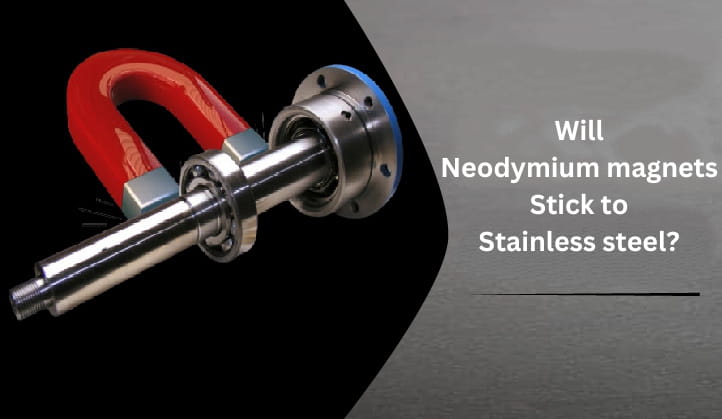Neodymium magnets, known as rare-earth magnets, powerfully and flexibly serve various applications, including electric motors, headphones, and magnetic jewelry clasps. Many people often wonder if neodymium magnets stick to stainless steel. This article will thoroughly investigate this question and provide the necessary information.

Will neodymium magnets stick to stainless steel?
Not all types of stainless steel are attracted to neodymium magnets. This is because stainless steel is categorized into three main groups: austenitic, ferritic, and martensitic stainless steel. Generally, ferritic stainless steel and martensitic stainless steel can be attracted by neodymium magnets, but austenitic stainless steel cannot be attracted.
Austenitic stainless steel contains 16%-26% chromium and less than 35% nickel, making it non-magnetic or weakly magnetic. On the other hand, ferritic stainless steel contains 10.5%-27% chromium without nickel, and martensitic stainless steel usually contains 11.5%-18% chromium and less than 1.2% carbon, and sometimes nickel. Ferritic stainless steel and martensitic stainless steel have a high content of ferromagnetic substances and are usually attracted to magnets.
Why is my magnet not sticking to stainless steel?
Suppose your magnets do not stick to stainless steel because it depends on the composition of stainless steel. It will not be magnetic if the stainless steel contains a high amount of chromium and either a minimum amount of nickel or an equal amount of manganese because the presence of these elements causes the steel’s structure to become austenitic, which has no magnetic conductivity.
Will a magnet stick to 304 stainless steel?
No, 304 stainless steel is an austenitic stainless steel, which means it is non-magnetic. This type of stainless steel, which contains 18-20% chromium and 8-10.50% nickel, is only slightly responsive to magnetic fields. Although it may become slightly magnetic in areas that have been cold-working, such as bending or welding, it will not be strongly magnetic.
Will a magnet stick to 316 stainless steel?
No, a magnet will not stick to 316 stainless steel. This is because 316 stainless steel is part of the austenitic stainless steel family, which is non-magnetic. Although specific circumstances may cause objects made of 316 stainless steel to be magnetic, 316 stainless steel is generally not magnetic. This makes it suitable for use in applications where magnetism can interfere, such as medical or electronic equipment.
Applications of Neodymium Magnets and Stainless Steel
Use of neodymium magnets with stainless steel in industry
The industry often utilizes neodymium magnets and stainless steel for various applications. Neodymium magnets find use in motors, generators, and magnetic bearings. On the other hand, stainless steel offers robustness and corrosion resistance and, thus, finds application in a broad range of products such as pipes, valves, and tanks.
Use of neodymium magnets with stainless steel in household items
Many household items also use neodymium magnets and stainless steel. Magnetic knife holders, refrigerator magnets, and magnetic cabinet closures often use neodymium magnets, whereas appliances, cookware, and utensils utilize stainless steel.
Conclusion
In conclusion, it is essential to note that not all types of stainless steel are attracted to neodymium magnets. Ferritic and martensitic stainless steel are two of the most common types of stainless steel which can be attracted. However, austenitic stainless steel is not typically attracted to neodymium magnets due to its high chromium and nickel content. Therefore, it is advisable to research your specific type of stainless steel to determine if a neodymium magnet will stick.
FAQs
Are all types of stainless steel magnetic?
No, not all types of stainless steel are magnetic. Only certain types, such as ferritic stainless steel and martensitic stainless steel, are magnetic.
How do I determine if my stainless steel is magnetic?
To ascertain the magnetic properties of your stainless steel, it is advisable to employ a magnet to conduct a test. If the magnet adheres to the stainless steel surface, it possesses magnetic properties. Conversely, stainless steel lacks magnetic qualities if the magnet fails to adhere.



